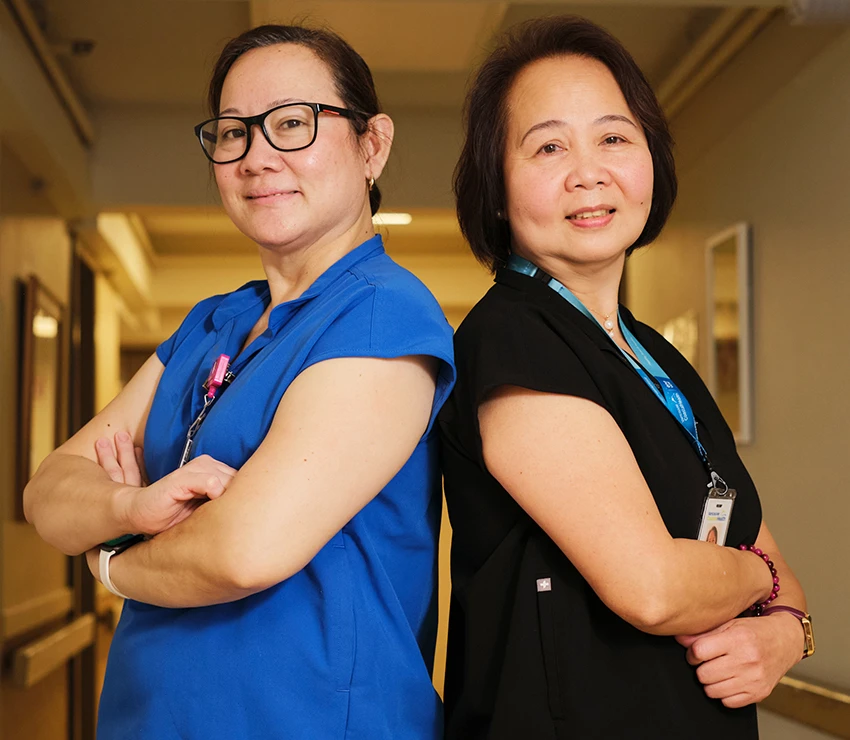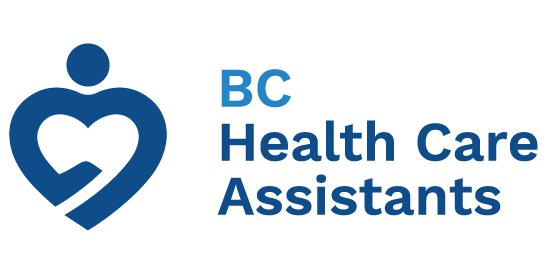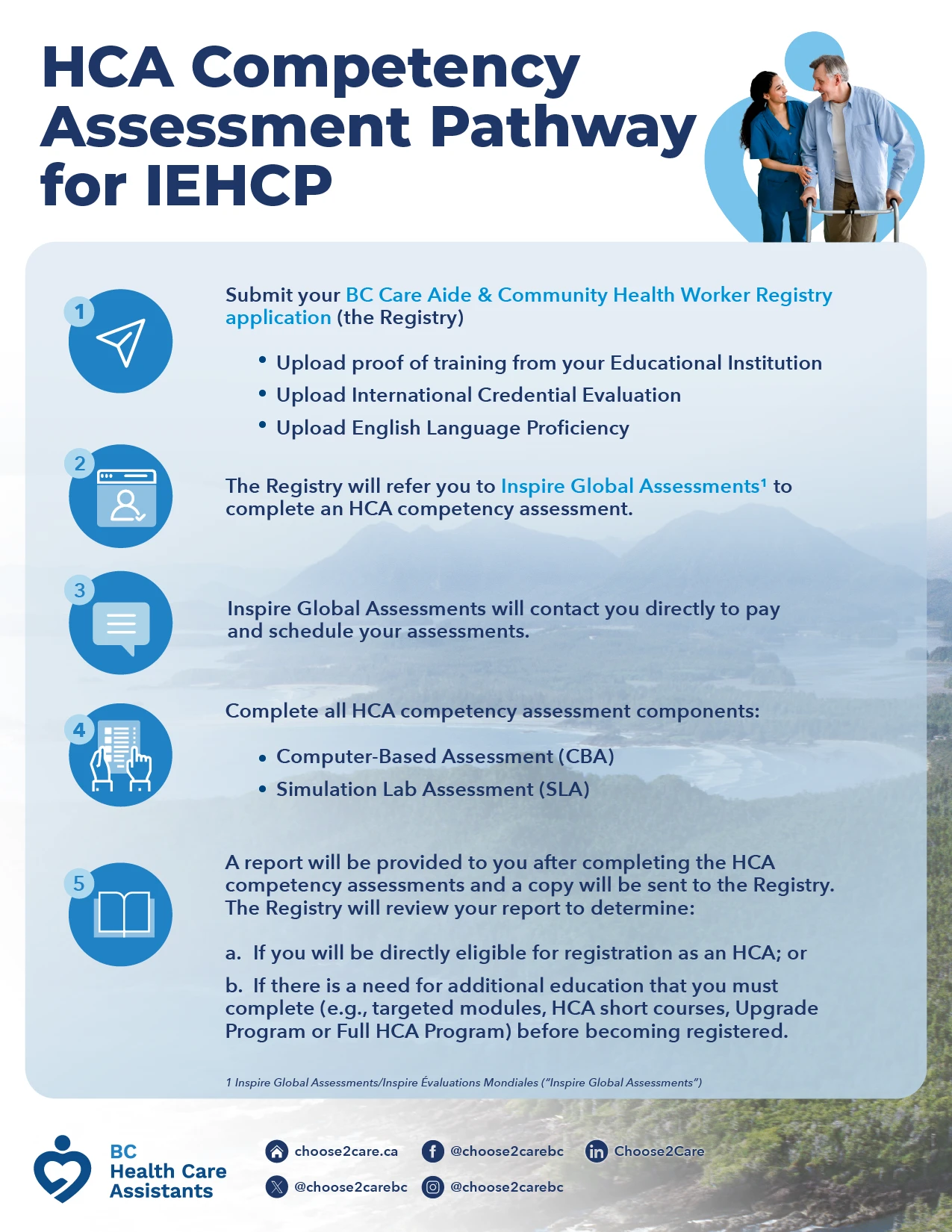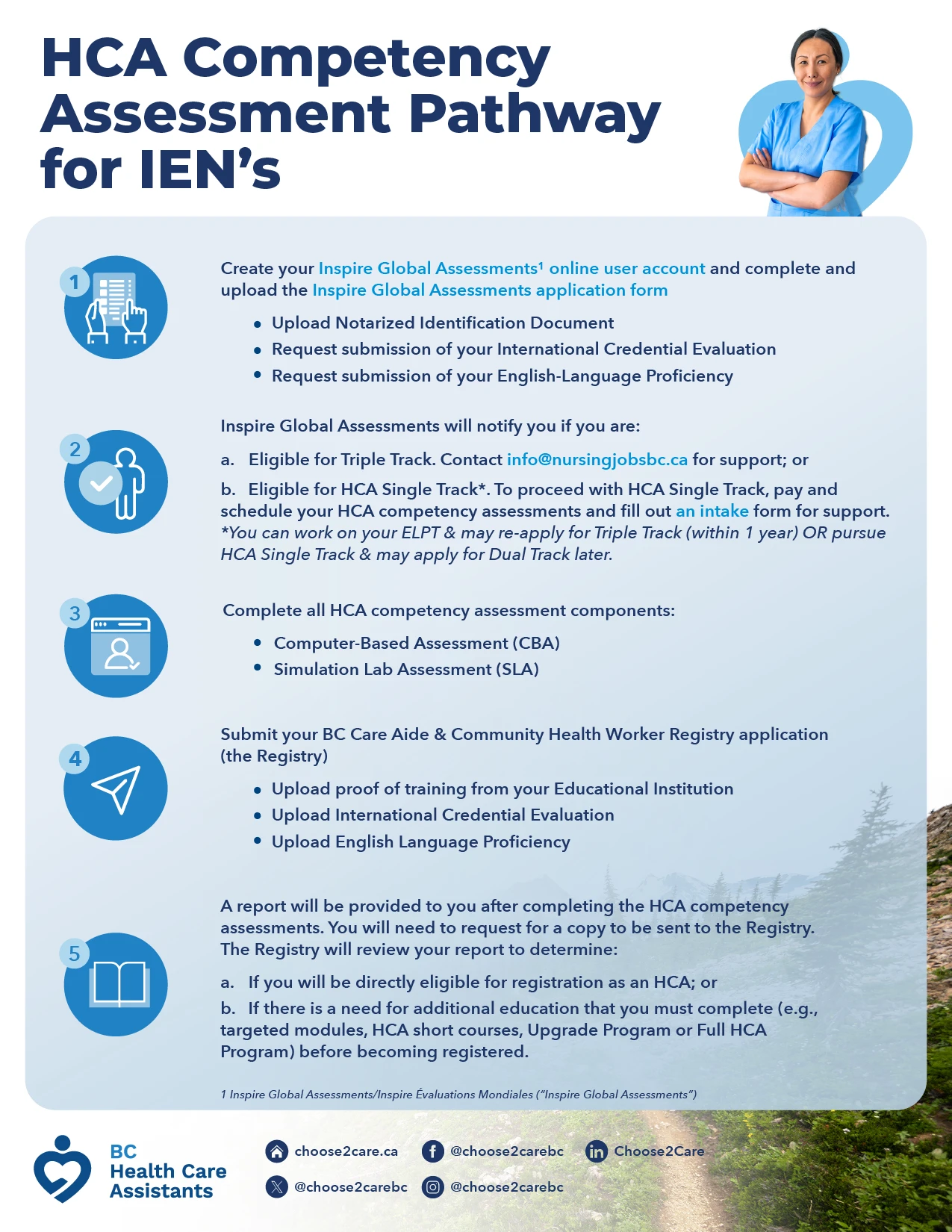Internationally Educated Health Care Professionals


Are you an Internationally Educated Health Care Professional?
With your existing education and experience, you may be eligible for registration as a Health Care Assistant in BC.
Within months, you could be earning pay and benefits as you build a healthcare career in Canada.
The advantages of becoming an HCA include providing person-centred care as part of a team, networking with other health care professionals, learning about organizational structures, deepening your professional values, and increasing your proficiency with healthcare language and terminology in Canadian practice environments.
Success Stories
Find out what people say about starting their new career in British Columbia.
Pathways to Registration
Consider integrating into the Canadian healthcare workforce more quickly as a Health Care Assistant.
Depending on your background, there are several pathways to becoming a registered HCA:
Financial Supports
Consider integrating into the Canadian healthcare workforce more quickly as a Health Care Assistant.
There are several financial support options available through Health Match BC to help you with costs associated with the registration pathway you choose.
- HCA Bursary Program (HCA Competency Assessment & Remedial Education Bursaries)
- HCAP Pre-Requisite Stipend
- HCA Training Program – BC Care Providers Association provides free training at select post-secondary institutions for participants who are unemployed, precariously employed, or employed but requiring upskilling

Financial supports outside of Health Match BC include:
- Career Paths for Skilled Immigrants Program helps newcomers living in BC build an action plan to navigate the system, receive financial support to assess credentials, and upgrade skills. Apply here
- Progressive Intercultural Community Services Society (PICS) offers fully funded Health Care Assistant Programs for individuals on EI, EI Reachback or WorkBC attached
- Windmill Microlending offers low-interest loans of up to $15,000 to help skilled immigrants start their careers
- Foreign Credential Recognition (FCR) H.E.T. Program offers loans up to $15,000 to cover costs of credentialing
- Global Talent Loans Program (ISSBC) provides financial support for re-credentialing or retraining
- DIVERSEcity microloan programs (VanCity) offers microloans of up to $10,000 to attain Canadian certification
- With These Hands Loan can fund tools or equipment needed to enter the labour market
- Back to Work Loan helps support upgrading your qualifications or certification
- StudentAidBC helps with costs of post-secondary education through student loans, grants, and scholarships
Education

Completing a full HCA program at a recognized post-secondary institution may be beneficial to learning how the Canadian healthcare system works and for gaining hands-on experience during clinical placements.
To be admitted to an HCA program, you must demonstrate that you meet the BC HCA Program English Language Competency Requirements.
Find out about testing centres for HCA program entry:
If English is not your first language, you may wish to explore HCA ESL programs, which include additional English language training. Browse all the recognized institutions offering the HCA program across British Columbia on our Education page.
Employment
While you are in the process of getting your credentials recognized, you can put your training and experience to immediate use. Your skills, such as the ability to work well with others, good communication skills, patience, compassion, and experience assisting the elderly in daily living activities, are needed in a variety of employment or volunteer opportunities. Below are some examples of positions you might explore, depending on your experience.
Acute/Hospital Facilities
Hospital Porter, Dialysis Technician, Unit Clerk, Housekeeper, Screener/Greeter*
Long-Term Care Homes / Assisted Living Residences
Housekeeper, Food Server, Laundry Attendant, Dietary Aide, Cook, Health Care Support Worker, Screener/Greeter*
Community-based
Private in-home Caregiver, Home Health Companion, Health Care Support Worker
Other
Community Support Worker, Mental Health Worker, Doula
Browse employment opportunities before and after registration, in both public and private healthcare sectors on our Employment page.
Are you an Internationally Educated Nurse (IEN)?

Get to work quickly with provisional licensing, tailored recruitment supports, streamlined immigration processes, and transitional education programs. Find out more at Nursing Jobs BC. Bursaries and financial supports may be available.
Internationally Educated Health Care Professionals FAQ
What are the advantages of registering as a Health Care Assistant for internationally educated health care professionals?
By working as an HCA, you will gain familiarity with the Canadian health care system, utilize your patient care skills, access a comprehensive salary and benefits package, and establish professional networks.
What are the HCA registration requirements for internationally educated health care professionals?
Requirements to register as an HCA include proof of training from your education institution, English language proficiency, and International Credential Evaluation Services (ICES) Basic Evaluation Report. For more information on registration requirements, click here.
What is the registration pathway for internationally educated health care professionals?
There are several pathways to become a registered HCA that you may be eligible for dependent on your background. If you have previous HCA or health-related education completed outside of BC, you may be eligible to complete a competency assessment to confirm that you meet BC HCA Core Competencies.
Another option is to complete a recognized BC HCA education program (approximately seven months. For more information on the pathways to become an HCA, click here.
Are there any financial supports available to assist with expenses related to obtaining HCA credentials?
Yes, there are several financial assistance options that you may be able to access, depending on your eligibility. Please visit our Bursaries & Stipends page.
Internationally Educated Nurses (IENs) FAQ
What are the advantages of registering as a Health Care Assistant for internationally educated nurses?
By working as an HCA, you will gain familiarity with the Canadian health care system, utilize your patient care skills, access a comprehensive salary and benefits package, and establish professional networks.
What are the HCA registration requirements for internationally educated nurses?
Nurses educated outside of Canada and not licenced to practice in Canada, who wish to register as an HCA, must apply to register as Internationally Educated Health Care Professionals. For more information on registration requirements, click here.
What is the registration pathway for internationally educated nurses?
There are several pathways to become a registered HCA that you may be eligible for dependent on your background. If you have previous HCA or health-related education completed outside of BC, you may be eligible to complete a competency assessment to confirm that you meet BC HCA Core Competencies.
Another option is to complete a recognized BC HCA education program (approximately seven months).
Are there any financial supports available to assist with expenses related to obtaining HCA credentials?
Yes, there are several financial assistance options that you may be able to access, depending on your eligibility. Please visit our Bursaries & Stipends page.
What bridging education programs exist in BC for internationally educated nurses?
Thompson Rivers University (TRU) Return to Registered Nurse Practice Certificate and Kwantlen Polytechnic University (KPU) Graduate Nurse, Internationally Educated Re-entry (GNIE). Visit the websites for admission requirements and the application process.
Nursing Students in Canada FAQ
1. What are the benefits of registering as a Health Care Assistant for nursing students?
As a nursing student, the benefits to registering as an HCA include obtaining additional patient care experience in a hands-on way that can supplement your nursing education, providing person-centred care as part of a team, networking with other health care professionals, deepening your professional values and earning above minimum wage.
2. What are the HCA registration requirements for nursing students?
Once you have completed sufficient training (typically one year of coursework), you can apply to the BC Care Aide & Community Health Worker Registry website and upload your official transcript, student competency reference letter, and character reference letter.
3. How much training do I need to have completed to be eligible to register as an HCA?
You need to be currently enrolled in a nursing program in Canada, and you must have completed sufficient training, typically one year of coursework. Please review Appendix 1 Nursing Student Programs - Coursework for Full HCA Registration.
4. Which nursing programs are recognized to be eligible to register as an HCA?
Your nursing program must be approved by a Canadian nursing regulatory body, such as the BC College of Nurses & Midwives (BCCNM).
5. How much do Health Care Assistants get paid?
According to information from the Health Employers Association of BC, the starting hourly wage of a Health Care Assistant working in a publicly funded setting can range from $27.11 to $28.74 (wage as of April 1, 2023), depending on the employment sector. As a full-time or part-time employee, you would have access to a comprehensive benefits package and a benefit pension plan through the Municipal Pension Plan. Most HCAs start with casual or part-time employment and work up to full-time status gradually.
Choose a Career in Providing Care
Site Map
Privacy Policy
Terms Of Use
Contact Us


